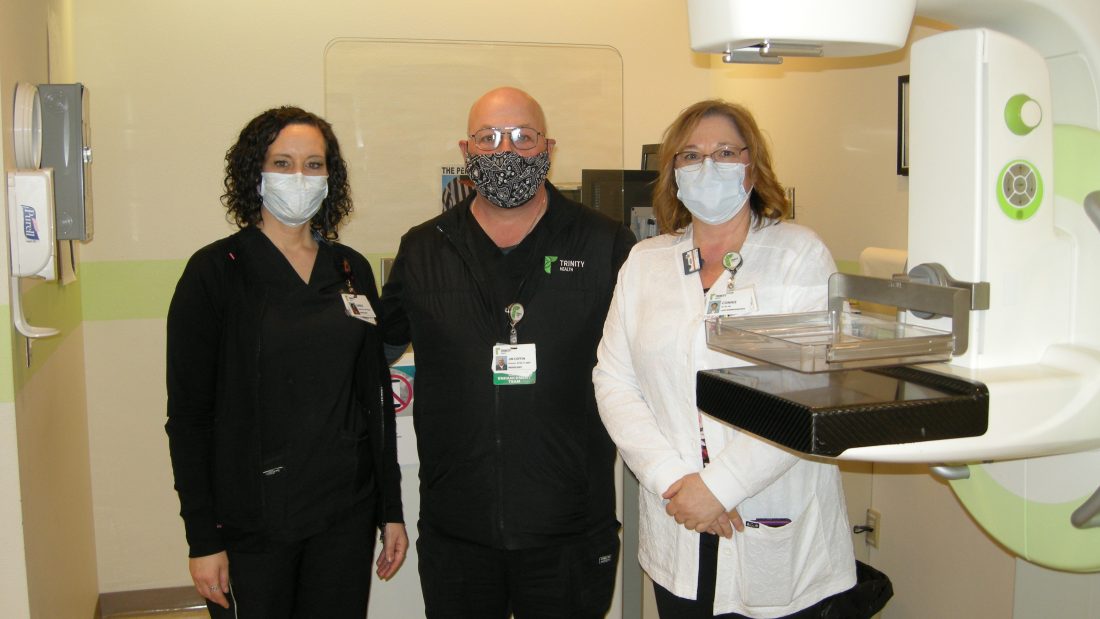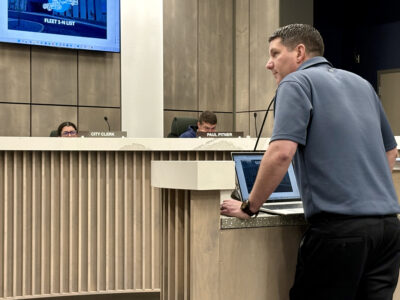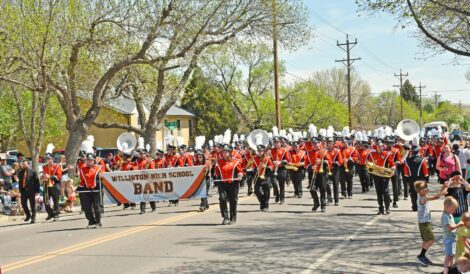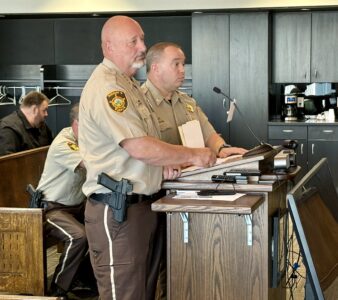Trinity Health urges people to get mammograms

Andrea Johnson/MDN From left to right, Trinity Health mammographer Amber Tisi, radiology director Jim Coffin, and lead mammographer Connie Busch. Both Tisi and Busch were recently diagnosed with breast cancer. Trinity Health urges people to get breast cancer screenings.
Mammograms are a personal issue for the staff at Trinity Health’s breast imaging center, many of whom have either battled cancer themselves or have lost family members to the disease.
They are worried that people have been putting off breast cancer screening due to the ongoing coronavirus pandemic.
“We don’t know how many people delayed,” said Jim Coffin, director of radiology. “We know what our numbers are. We see our statistics and they’re pretty close to what would be normal but we do know that there are people that have put things off, screening studies, mammography being just one of them but it’s an important one and the reason it’s so important is because we know that our radiologists find breast cancer every single week with screening mammography. So, as the population turns and young women come into the fold when they become eligible, if you will, for their first mammogram, if they haven’t done that, then there’s a piece of our population that hasn’t gotten proper care. And it’s not because we’re not open and ready because we are here, we are ready, we have the staff, we have the equipment but if people have put off coming in because of COVID, please don’t do that. Please come and see us. It doesn’t even have to be us. it can be a clinic near you, it can be Williston’s clinic, we have a mobile route that goes out on our behalf. we’re contracted with a company called DMS and they go to a lot of different sites and our radiologists read all those mammograms from all of those sites.”
Breast cancer is more easily treated and patients have a better prognosis when the disease can be caught at an earlier stage.
Coffin’s sister has been affected by the disease and, during the pandemic, lead mammographer Connie Busch and mammographer Amber Tisi, were diagnosed themselves with breast cancer.
Busch said many members of her family have had breast cancer. She first had genetic testing done more than 20 years ago because her family was part of a study into genetic links to breast cancer. At the time, she was told she didn’t carry a mutant gene that would put her at higher risk of developing breast cancer. But Busch decided to undergo further testing after her brother was diagnosed with breast cancer. The updated testing showed that she carried a mutant gene after all.
Busch’s brother died of his breast cancer last year. Busch underwent a bilateral mastectomy and reconstructive surgery in the hope that she could avoid developing breast cancer herself. After her surgery, her breast tissue was tested and it was found to be cancerous.
“So I went there, thinking in doing this, I don’t have cancer, I’m going to prevent myself from that cancer developing before I can do anything and then find out I already had a cancer,” said Busch. “But I was very, very fortunate because the decision to do the mastectomy meant that I didn’t have to have anything else done. I didn’t have to have any further treatment. I didn’t have to have any radiation, no further surgeries, I was done with my cancer treatment. For me, I couldn’t have found it earlier. That was the earliest possible time.”
Busch has always felt for the patients she works with, but now she said she understands personally what they might be going through.
“I was always an advocate for my patients but now when I say, ‘I’ve been in your shoes,’ I can really say I’ve been in their shoes,” said Busch. “And so I think some of the patients, they really take that more to heart when I tell them my story. I’m not just their mammographer, I’m their cancer sister.”
About the same time as Busch was diagnosed, Tisi was diagnosed with breast cancer at the young age of 38 after she underwent screening using 3D imaging at Trinity Health.
Coffin said Tisi had experienced some pain and had felt a lump, so she underwent a mammography screening at Trinity Health. Trinity did the mammogram using both two-dimensional and three-dimensional imaging.
“Her breast cancer wasn’t seen on 2D imaging,” said Coffin. “It was only seen on 3D.”
Because it was caught, Tisi was able to undergo bilateral mastectomy and reconstruction and follow-up treatment.
Coffin said American College of Radiology guidelines recommend that a woman get a baseline mammogram at 35 and earlier if there is a family history of breast cancer. Insurance will cover the screening exams and there might be grants and assistance programs available for people who do not have insurance or who find it difficult to pay their insurance co-payments or for medical treatment.
Trinity Health has always invested in the latest technology to ensure that it can catch cancers as early as possible, said Coffin and Bush.
“We just did our first breast biopsy on our new 3 T Coil. So we have a brand new coil for our MRI (magnetic resonance imaging machine) that’s up at the Advanced Imaging Center,” said Coffin. “There’s a reason why we call it the Advanced Imaging Center. We have a new radiologist (Dr. Brian Johnson) that joined the team in July of 2020. He’s a fellowshiped, trained breast mammographer — radiologist/reader. That’s pretty awesome for Minot to have, the community to have, North Dakota to have. And we serve a wide swath. We read mammos all the way from Devils Lake to Crosby to Williston to Garrison to New Town, Rugby, Rolla, Belcourt, Bottineau, and then a lot of other … smaller places in between where the mobile goes.”
Coffin said the new, more powerful, 3 T coil for the MRI coil is one more tool in the toolbag that will aid Trinity in diagnosing cancers like Busch’s that could not be diagnosed using previous available technology.
“Sometimes when women have very dense breasts, even with Tomosynthesis 3D imaging, they can be difficult to evaluate. Connie was difficult to evaluate,” said Coffin.
Busch said she her own cancer was not detected even though she had both a mammogram and an MRI of her breasts done before she had her bilateral mastectomy. Her cancer was not identified because her breasts were too dense and the cancer was too small.
“When I say breast imaging, you know most people just think mammography but it’s not really just mammography,” said Busch. “Mammography is the first piece in the puzzle. We’ll do a mammogram and then that might not give you the whole answer. So you might have to have an ultrasound, you might have to have an MRI, you might end up having to have a biopsy to get that final answer (to) do I have cancer or do I not have cancer? You kind of have to think of the mammogram as the first step, it’s not the end step. But you have to make the first step to find it.”





